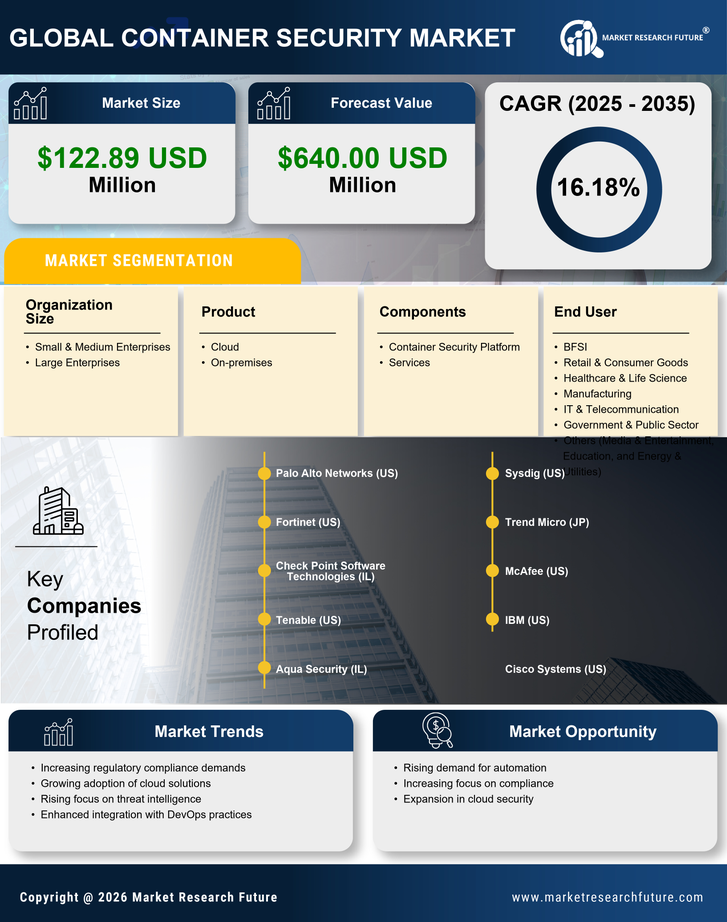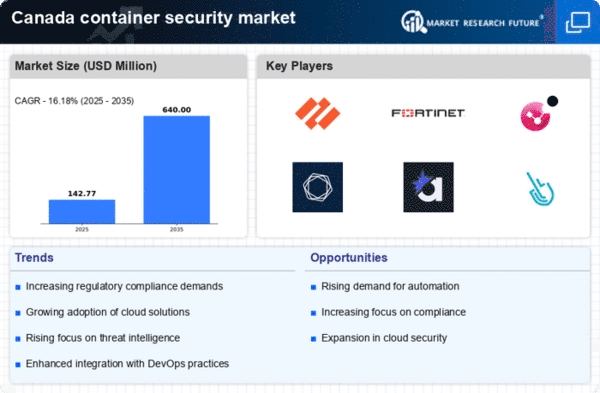Growing Regulatory Landscape
The evolving regulatory landscape in Canada is significantly influencing the container security market. With increasing scrutiny on data protection and privacy, organizations are compelled to adopt stringent security measures to comply with regulations such as the Personal Information Protection and Electronic Documents Act (PIPEDA). In 2025, it is anticipated that compliance-related expenditures will account for approximately 15% of IT budgets in Canadian companies. This regulatory pressure is driving investments in container security solutions, as businesses seek to avoid hefty fines and reputational damage associated with non-compliance. The container security market is thus poised for growth as organizations prioritize compliance-driven security measures.
Rising Cybersecurity Threats
The container security market in Canada is experiencing heightened demand due to the increasing frequency and sophistication of cyber threats. Organizations are recognizing the necessity of robust security measures to protect their containerized applications and data. In 2025, it is estimated that cyberattacks could cost Canadian businesses upwards of $10 billion annually, prompting a shift towards advanced security solutions. This trend indicates a growing awareness among enterprises regarding the vulnerabilities associated with container technology. As a result, investments in container security solutions are likely to surge, with companies prioritizing the implementation of comprehensive security frameworks to mitigate risks. is positioned for significant growth as businesses seek to safeguard their digital assets against evolving cyber threats..
Demand for DevSecOps Practices
The container security market in Canada is witnessing a shift towards the integration of security within the DevOps lifecycle, commonly referred to as DevSecOps. This approach emphasizes the importance of embedding security practices throughout the development process, thereby enhancing the overall security posture of containerized applications. In 2025, it is estimated that 60% of Canadian organizations will adopt DevSecOps methodologies, leading to increased investments in container security tools and practices. This trend suggests a growing recognition of the need for proactive security measures, as businesses aim to address vulnerabilities early in the development cycle. Consequently, the container security market is likely to thrive as organizations embrace this holistic approach to security.
Increased Adoption of Cloud Services
The container security market in Canada is benefiting from the accelerated adoption of cloud services across various sectors. As organizations migrate their operations to the cloud, the need for effective security measures to protect containerized applications becomes paramount. In 2025, it is projected that over 70% of Canadian enterprises will utilize cloud-based solutions, creating a substantial demand for container security technologies. This shift not only enhances operational efficiency but also necessitates the implementation of stringent security protocols to safeguard sensitive data. Consequently, the container security market is likely to expand as businesses invest in solutions that ensure compliance and protect against potential breaches in cloud environments.
Emergence of Container Orchestration Technologies
The rise of container orchestration technologies, such as Kubernetes, is significantly impacting the container security market in Canada. As organizations increasingly adopt these technologies to manage their containerized applications, the demand for security solutions tailored to orchestration environments is growing. In 2025, it is projected that over 50% of Canadian enterprises will implement container orchestration, necessitating robust security measures to protect against potential vulnerabilities. This trend indicates a shift towards more complex container environments, where security becomes a critical consideration. As a result, the container security market is likely to expand as businesses seek specialized solutions to address the unique security challenges posed by orchestration technologies.

















